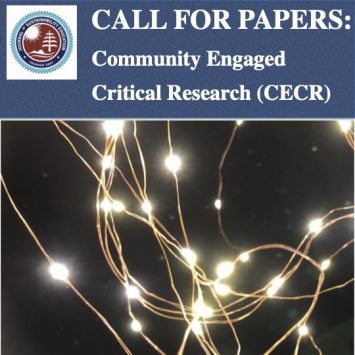Call for Papers: Community Engaged Critical Research (CECR)
The Journal of Sustainability Education (JSE) serves as a forum for academics, organizers, educators, and practitioners to share, critique, and promote research, practices, and initiatives that foster the integration of economic, ecological, and social-cultural dimensions of sustainability within formal and non-formal educational contexts.
This special issue centers on Community Engaged Critical Research (CECR) as a dynamic form of sustainability education for social learning and knowledge creation. CECR refers to a constellation of approaches and practices attentive to power relationships. To do CECR expresses a commitment to sharing power with all partners involved in a research project at every step of the research endeavor. The CECR model critiques the extractive, hierarchical, and often colonizing nature of research that leverages the researcher’s status, power, and position well above those researched (and often invisibilizes, dehumanizes, or degrades the research ‘subjects’). The end goal of CECR is to support the community-led initiatives of, agency development, and liberation for those engaged in the research at a time of significantly complex societal and environmental changes.
Special issue editors invite submissions on this theme across four areas: foundations capacity building/areas of opportunity; pedagogy and training; and reflexivity, assessment and ethics. See example questions for each thematic area below for potential starting places. Interested scholars should register as a user in the JSE’s article management system, RATS, and send full papers to editor (at) susted.com by August 30, 2024, with the tag line “CECR Submission” in the subject line of their email. Peer reviews will be conducted in the fall of 2024, with issue publication January, 2025. JSE author instructions are available here.
Foundations
● What are the purposes of research? Who and what does it tend to serve?
● Whose questions often propel a research project? What are the implications behind
the origin of those prioritized questions?
● How might research be experienced as life and death by some people and
communities?
● How can research be a means to shift power, capital, and resources? What are
adaptive strategies that may aid and assist in that endeavor?
● What are new ways of “researching with and for” social and environmental justice,
reciprocity, and wellness?
Capacity Building/Areas of Opportunity
● How can this approach to research become more common, accessible, and navigable
by communities, institutions and ourselves?
● What are models for international and field station operations and protocols for
inviting and negotiating Indigenous research agenda setting with community
members, visiting scholars, and students?
● What collaborations, projects, or issues would you like to bring to or develop through
this discussion?
● Where are opportunities for international, federal, philanthropic and community
based cultivation of and support for CECR?
Pedagogy & Training
● What place should Community Engaged Critical Research have in the future of higher
education, STEAM research, and/or responsible innovation?
● How can CECR pedagogy be delivered through low-residency, online or hybridized
program offerings as an expression of experiential learning and co-creation building,
learning, and teaching?
Reflexivity, Assessment & Ethics
● What do characteristics of extractive, not-community-centric research look like? In what
ways have you participated in this?
● What kinds of community support, resources, and ideas might help you avoid pitfalls of
extractive research as default?
● What strategies will you employ to ensure the work you and the community do is,
indeed, for (and led by) the health and justice of communities?
● How should institutional structures and policies (ethics training, faculty governance and
promotion, and human and more than human subjects protection and risk
management) be reframed?
Please direct questions and submissions to Clare Hintz, Editor, at
editor (at) susted.com. JSE author instructions are available here.











